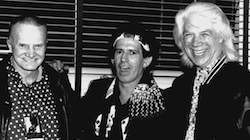Phonodisc
November 22, 2017

Phonodisc
Phonodisc came late to the Canadian record industry. It was launched in April of 1956 by founder Don McKim as Canada’s newest independent record company, but by then, the Canadian scene was already crowded with most of the majors – Capitol, Columbia, Compo, RCA Victor and several others.
But Phonodisc was the little company that could. And they did…at least for a while.
Like many of the other Canadian indies, Phonodisc depended on licensing recordings from American and British sources. One of the slogans on their early 45rpm record sleeves was “One Hit Leads To Another From Phonodisc”.
Their initial label affiliations were with King Records, founded by Syd Nathan and based in Cincinnati, Ohio, which gave Phonodisc Canadian distribution rights to all of James Brown and The Famous Flames’ recordings (“Papa’s Got A Brand New Bag”, “It’s A Man’s Man’s Man’s World”), as well as artists such as Hank Ballard (the writer of the biggest dance craze of the 1960’s, the Twist), bluesman Freddie King, Earl Bostic, Bill Doggett, Billy Ward and His Dominoes along with Little Willie John.
The Del-Fi/Donna/Mustang labels owned by Bob Keane in Los Angeles were also represented by Phonodisc in Canada. Keane, a former big bandleader and clarinet player, produced, recorded and released hits by Ritchie Valens (“Come On, Let’s Go”, “Donna” and “La Bamba”), Ron Holden (“Love You So”), former “Mickey Mouse Club” mousekateer and 60’s TV star of “The Rifleman” Johnny Crawford (“Your Nose Is Gonna Grow” and “Cindy’s Birthday”) and The Bobby Fuller Four (“I Fought The Law”).
Other American. and British record companies signed for Canadian distribution by Phonodisc were Audio Fidelity (with its large catalogue of sound effects records); Kapp/Congress (with artists such as Jack Jones, Paul Evans, Shirley Ellis, Linda Scott, early Dave Clark Five, The Searchers and very early Elton John singles); Warwick (Johnny & The Hurricanes, The String-A-Longs and The Fireballs), Sue Records (Wilbert Harrison, Baby Washington, Jimmy McGriff, Barbara George, Inez and Charlie Foxx, The Duals and Ike & Tina Turner), Jubilee and Carlton Records (with artists Jack Scott, Merv Griffin and Anita Bryant). In 1968, Phonodisc signed a licensing agreement with Britain’s Pye label (The Kinks).
In the early 1960’s, Phonodisc managed to grab Canadian rights to Chicago based labels, Chess/Checker/Argo from Quality Records, which gave them access to recordings from Chuck Berry, the Ramsey Lewis Trio (“The In Crowd”), The Sensations (“Let Me In”) and Bo Diddley, among many others.
While all of these labels produced successful 45rpm hits and album sales in Canada for Phonodisc, there was a new record company in Detroit that President Don McKim and his staff were quite excited about. It had been launched with a family loan of $800.00 by former professional boxer, fledgling songwriter and Ford/Lincoln/Mercury assembly line worker Berry Gordy Jr. That company became world famous as Hitsville U.S.A. aka Motown. Gordy’s first label was named Tamla, which had such artists as The Miracles (later known as Smokey Robinson & The Miracles), Stevie Wonder, Marvin Gaye, Barrett Strong and The Marvellettes. Later labels were Gordy, Motown and Rare Earth (Motown’s ‘rock and roll’ label).
Ron Newman was Phonodisc’s superstar promotion man. Ron’s personality was so infectious and likeable, that he was able to build strong, lasting relationships with many disc jockeys and radio stations across Canada, which is crucial for record company airplay for their artists. Ron became so successful that Motown hired him and moved him to Detroit. Ron’s son, Garry Newman, who also went into the record business and eventually became President of Warner Music Canada, remembers staying with his dad as a teenager, “He had a farm in Stouffville [Ontario] and I can tell you one time at Christmas, he had The Temptations performing in the basement. Lionel Richie was there with The Commodores. Lionel signed my dad’s piano. My father used to say, ‘You can bring ten friends’, so first I would pick all guys, and then [as I got older], it was five guys and five girls. They’d all say, ‘Who’s going to be singing’ and when I’d tell them, they all went crazy.”
Phonodisc had a highly successful run as distributor (Billboard Magazine, the bible of the music industry titled a December 1968 article on Phonodisc as “David Among Goliaths”), and although Motown eventually left to form their own Canadian organization, Phonodisc continued on with its other label licensors. In the 1970’s, they opened an office in New York. Phonodisc did release albums by Canadian performers as The Munks, Tommy Ambrose, Peter Pringle, Newfoundlanders Figgy Duff and Edmonton’s Belinda Metz, but these were not best sellers and Phonodisc closed its doors in the 1980’s.
Back to Videos